|
|
|
Sort Order |
|
|
|
Items / Page
|
|
|
|
|
|
|
| Srl | Item |
| 1 |
ID:
131842
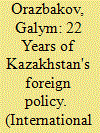

|
|
|
|
|
| Publication |
2014.
|
| Summary/Abstract |
THE LAST QUARTER of the 20th century was marked by growing globalization, which has impacted virtually all spheres of public activity. As it gained momentum, globalization has helped revitalize international collaboration, involving the world's leading economies and global international institutions.
From the early 1990s, vivid discussions unfolded in international political and scholarly circles about a new world order, the role and place of nation states and multinational TNCs in it, and the goals and methods of foreign policy amid the growing globalization. This process confronted many countries with the need to improve their competitiveness on the world market, striking an optimal balance between domestic and foreign policy.
|
|
|
|
|
|
|
|
|
|
|
|
|
|
|
|
| 2 |
ID:
128430
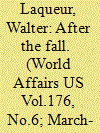

|
|
|
|
|
| Publication |
2014.
|
| Summary/Abstract |
As the Soviet Union disintegrated, ending on the ash heap of history in 1989-91, all the institutes for the study of Marxism-Leninism that had justified the regime, the collected and selected works of the communist classics, and the Marxism chairs in academies and universities also disappeared. From this void emerged a burning question: What was the raison d'être of the existing political system? And later, how did the new regime justify itself in the field of foreign and domestic affairs, and what was its social and economic policy? For the answers, Vladimir Putin and his followers went back to the future. Russia's official ideology prior to 1917 was Pravoslavie, Samoderzhavie,Narodnost, which has been translated as Orthodoxy, Autocracy, Nationality. This statement was made first by Sergei Uvarov, the Russian minister of education, in a circular letter in 1833. Uvarov was a learned man who also served as president of the Russian Academy of Sciences. No one had asked Uvarov to prepare such an official binding declaration. However, Czar Nicholas I liked this "triad," as it was called, even though its meaning was by no means always clear.
|
|
|
|
|
|
|
|
|
|
|
|
|
|
|
|
| 3 |
ID:
127311
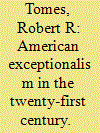

|
|
|
|
|
| Publication |
2014.
|
| Summary/Abstract |
Americans still believe their country is unique but are less convinced it has a special responsibility to lead. This has both domestic and international implications.
|
|
|
|
|
|
|
|
|
|
|
|
|
|
|
|
| 4 |
ID:
024810
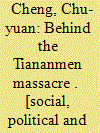

|
|
|
|
|
| Publication |
Boulder, Westview Press, 1990.
|
| Description |
xii, 256p.: ill., tableshbk
|
| Standard Number |
0813310474
|
|
|
|
|
|
|
|
|
|
|
|
Copies: C:1/I:0,R:0,Q:0
Circulation
| Accession# | Call# | Current Location | Status | Policy | Location |
| 032635 | 951.058/CHE 032635 | Main | On Shelf | General | |
|
|
|
|
| 5 |
ID:
085402
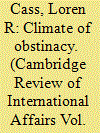

|
|
|
|
|
| Publication |
2008.
|
| Summary/Abstract |
Despite sharing a large number of attributes, Canada and Australia's foreign policy positions in international climate negotiations have varied significantly. Given the similarities in variables affecting climate policy, how do we explain the variation in foreign policy responses to climate change between the two countries? Rational choice and domestic political analyses have failed to fully explain the observed variation. National responses to climate change in Australia and Canada appear to be significantly shaped by ideational forces as well. In particular, political leaders have pursued symbolic climate policies to cultivate national identities for two distinct audiences-international partners and domestic voters. International climate policy positions have been frequently used as communication tools by both states with the resulting climate positions bearing little relationship to each government's domestic climate policies. The Australian and Canadian cases raise important questions regarding the relationship between foreign policy commitments and related domestic policy reforms, which have substantial implications for the effectiveness of global efforts to address climate change.
|
|
|
|
|
|
|
|
|
|
|
|
|
|
|
|
| 6 |
ID:
029695
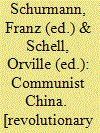

|
|
|
|
|
| Publication |
Haramondsworth, Penguin Books, 1967.
|
| Description |
xxxiii, 647p.pbk
|
| Series |
China Readings; 3
|
|
|
|
|
|
|
|
|
|
|
|
Copies: C:1/I:0,R:0,Q:0
Circulation
| Accession# | Call# | Current Location | Status | Policy | Location |
| 001791 | 951.05/SCH 001791 | Main | On Shelf | General | |
|
|
|
|
| 7 |
ID:
079139
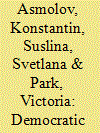

|
|
|
|
|
| Publication |
2007.
|
| Summary/Abstract |
The leader published simultaneously on the first day of 2007 in three central North Korean newspapers, Rodong Sinmun, Choson Inmingun, and Ch'ongnyon Chonwi, proclaimed the year just past an "unprecedented period in the chronicle of the life-giving Korean revolution imbued with ideas, when the country's positions reached the heights of a majestic and mighty power, which became a demonstration of the grandeur of the Korean nation." Accordingly, the year that just began was heralded as a "year of continued fulfillment of the Great Leader's design for building a powerful Homeland, a year when the country as a whole is permeated with the spirit of fresh accomplishments."1
"Acquisition of nuclear deterrent forces" was named the main event of 2006 in North Korea. These forces, says the New Year Day article, "is a mighty factor against the double-standard approach and the policy of sanctions and strangulation on the part of the U.S., a boost to the cause of peace and security in Northeast Asia."2 According to North Korean reports, nearly 100,000 people took part in the demonstration staged in support of the nuclear tests conducted on October 20, 2006.3
The year 2006 changed little in the domestic situation, which remained stable. The government machinery hummed along, mainly for "protocol". New monuments continued to be put up, as usual, to celebrate an anniversary or mark a visit by Kim Il Sung or Kim Jong Il to a site. Gala meetings were held or national rallies called, which were, as a rule, addressed by government representatives. On January 26, for example, a national convention of public service, party, and nongovernmental organizations was treated to a speech by Yang Hyong Sop, Vice Chairman of the Presidium of the Supreme People's Assembly (SPA). A convention of activists of the Union of Agricultural Workers was hold
|
|
|
|
|
|
|
|
|
|
|
|
|
|
|
|
| 8 |
ID:
116920
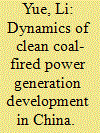

|
|
|
|
|
| Publication |
2012.
|
| Summary/Abstract |
Coal-fired power technology will play an important role over a long period in China. Clean coal-fired power technology is essential for the global GHG emission reduction. Recently, advanced supercritical (SC)/ultra-supercritical (USC) technology has made remarkable progress in China and greatly contributed to energy saving and emission reduction. This study analyzes the dynamics of SC/USC development in China from an integrated perspective. The result indicates that, besides the internal demand, the effective implementation of domestic public policy and technology transfer contributed greatly to the development of SC/USC technology in China. In future low carbon scenario, SC/USC coal-fired power technology might still be the most important power generation technology in China until 2040, and will have a significant application prospect in other developing countries. The analysis makes a very useful introduction for other advanced energy technology development, including a renewable energy technology, in China and other developing countries.
|
|
|
|
|
|
|
|
|
|
|
|
|
|
|
|
| 9 |
ID:
120677
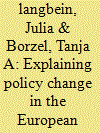

|
|
|
|
|
| Publication |
2013.
|
| Summary/Abstract |
This Introduction discusses the conventional wisdoms dominating the scholarship on policy change in the EU's Eastern neighbourhood countries and summarises the major findings of this collection. Drawing upon the empirical evidence underpinning the contributions to our collection, we argue that compliance with or convergence to EU policies happens despite high costs, limited capacities and the lack of EU membership prospects. We also challenge country-level or policy-type explanations that emphasise membership aspirations, asymmetric interdependencies between the EU and the neighbourhood countries, or the level of politicisation or institutionalisation characterising particular policy fields. Finally, our findings point towards important differences between membership, accession and neighbourhood Europeanisation by stressing factors mediating the EU's impact on policy change in the Eastern neighbourhood countries that played a rather marginal role in domestic policy change in EU member states and accession countries.
|
|
|
|
|
|
|
|
|
|
|
|
|
|
|
|
| 10 |
ID:
171587
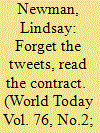

|
|
|
| 11 |
ID:
117977
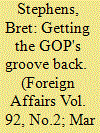

|
|
|
|
|
| Publication |
2013.
|
| Summary/Abstract |
After their loss last year, Republicans are grappling over what to do next -- and when it comes to foreign policy, small-government conservatives worried about debt are squaring off against big-military conservatives fearful of defense cuts. Fortunately, the GOP does not need a total makeover; what it needs is a renegotiated modus vivendi between the two competing camps, each of which has valuable things to teach the other.
|
|
|
|
|
|
|
|
|
|
|
|
|
|
|
|
| 12 |
ID:
027883
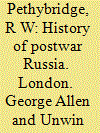

|
|
|
|
|
| Publication |
London, George Allen and Unwin Ltd., 1966.
|
| Description |
263p.hbk
|
| Series |
Minerva Series of Student's Handbooks
|
|
|
|
|
|
|
|
|
|
|
|
Copies: C:1/I:0,R:0,Q:0
Circulation
| Accession# | Call# | Current Location | Status | Policy | Location |
| 004306 | 947.085/PET 004306 | Main | On Shelf | General | |
|
|
|
|
| 13 |
ID:
110465
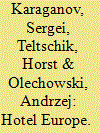

|
|
|
|
|
| Publication |
2011.
|
| Summary/Abstract |
We should not wait till the next crisis makes all the states it will affect in North America, the European Union and the rest of Europe realize that everybody is interested in close and friendly cooperation from Vancouver to Vladivostok. The way along this track has long been determined and responsible politicians should embark upon it.
|
|
|
|
|
|
|
|
|
|
|
|
|
|
|
|
| 14 |
ID:
114234
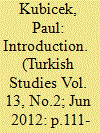

|
|
|
|
|
| Publication |
2012.
|
| Summary/Abstract |
Turkish voters elected a new National Assembly on June 12, 2011. As expected, the incumbent Justice and Development Party (AKP, Adalet ve Kalkinma Partisi) prevailed. This brief introductory article provides background on the elections and the main Turkish political parties. It also introduces the various contributions for this special issue that will analyze the impact this election will have on both domestic and foreign policy.
|
|
|
|
|
|
|
|
|
|
|
|
|
|
|
|
| 15 |
ID:
174527
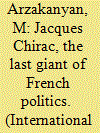

|
|
|
|
|
| Summary/Abstract |
JACQUES CHIRAC, the fifth President of the Fifth Republic, the most prominent French politician of the turn of the 21st century, during his 40-year long political career, climbed the ladder from young deputy of the National Assembly to wise and experienced President of the Republic occupying the highest state post for two terms. Twenty-five years ago, in 1995, when Chirac was elected president, the International Affairs journal published my article about him. Last fall, the famous politician died. This means that the time has come to sum up his achievements at the service of France.
|
|
|
|
|
|
|
|
|
|
|
|
|
|
|
|
| 16 |
ID:
139529


|
|
|
|
|
| Summary/Abstract |
This study examines the effect of domestic political change on United Nations General Assembly (UNGA) voting. We argue that foreign policy change is most likely when a new leader—one who relies on different societal groups for support than her predecessor—comes to power. We then examine the extent that domestic institutional context—in particular, democracy—shapes this process. We test our hypotheses using a new measure of UNGA voting patterns and new data on changes in leaders' supporting coalitions. We find that change in the societal support base of leaders leads to change in UN voting, especially in nondemocracies. This study lends credence to the perspective that foreign policy, like domestic policy, can vary with the particular interests that leaders represent; it encourages scholars to focus less on leadership change per se and more on changes in the societal groups to which leaders are most accountable. This study also suggests that democratic institutions inspire policy consistency not only in areas governed by treaties and international law, but also in areas of foreign policy that are easier to alter in the short term.
|
|
|
|
|
|
|
|
|
|
|
|
|
|
|
|
| 17 |
ID:
040448
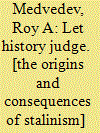

|
|
|
|
|
| Publication |
London, Macmillan, 1972.
|
| Description |
xxxiv, xviii, 566p.Hbk
|
| Standard Number |
333134095
|
|
|
|
|
|
|
|
|
|
|
|
Copies: C:1/I:0,R:0,Q:0
Circulation
| Accession# | Call# | Current Location | Status | Policy | Location |
| 009590 | 923.1/MED 009590 | Main | On Shelf | General | |
|
|
|
|
| 18 |
ID:
099653
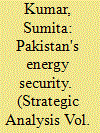

|
|
|
|
|
| Publication |
2010.
|
| Summary/Abstract |
Development prospects and economic growth in Pakistan, like in most other countries, will hinge on securing sustainable energy supplies. The Pakistan government has developed a strategy to enhance its energy production by 2030. This article explores the problems faced by the Pakistan government in optimising its use of indigenous energy resources and the implications that future plans to strengthen its energy security may have for its domestic and foreign policy.
|
|
|
|
|
|
|
|
|
|
|
|
|
|
|
|
| 19 |
ID:
185469
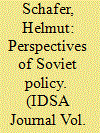

|
|
|
| 20 |
ID:
115029
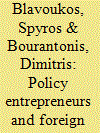

|
|
|
|
|
| Publication |
2012.
|
| Summary/Abstract |
Besides systemic changes that lead to the re-prioritization of foreign policy objectives, foreign policy change is also a result of domestic policy entrepreneurs' pursuit of a political return. Their potential to orchestrate change depends on the existing entry barriers that emanate from the political and institutional features of the domestic policy-making process. It is accentuated by system-wide developments and security crises that illustrate old policy failure. This article discusses the role of policy entrepreneurs in foreign policy change by reference to the Greek-Turkish rapprochement in the late 1990s that resulted in Turkey receiving the status of EU candidate country in 1999.
|
|
|
|
|
|
|
|
|
|
|
|
|
|
|
|
|
|
|
|
|